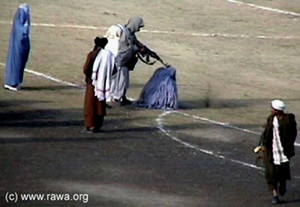The Afghan government should not grant Taliban representatives amnesty from prosecution for serious crimes as part of talks with the insurgent group, Human Rights Watch has said.
"Future government talks with the Taliban should not hinge upon denying justice to victims of war crimes and other abuses. Afghanistan's civilians should not be forced to choose between justice and peace," The News quoted Brad Adams, HRW Asia director, as saying.

Taliban executing a woman in a sports stadium in Kabul. The UN, Human Rights Watch, and others have collected considerable information implicating Taliban members in war crimes, including attacks targeting civilians, indiscriminate attacks by suicide bombers and pressure-plate mines, summary executions, and use of children in combat including as suicide bombers. (Photo: RAWA.org)
"The High Peace Council's call for immunity shows the dire predictions about the amnesty law coming true. Amnesty for war crimes does not need to be, and should not be, a precondition for talks between the Afghan government and the Taliban," he added.
Earlier on November 17, the chairman of Afghanistan's High Peace Council, Salahuddin Rabbani, had said that Taliban officials who join peace negotiations with the Afghan government will receive immunity from prosecution and will have their names removed from the United Nations sanctions.
Last week, the Pakistani government released nine imprisoned Taliban officials after the HPC requested their release during a visit to Pakistan. More of the estimated 50 Taliban members in prison in Pakistan are expected to be released at the council's request in the future. Rabbani has described those released as including "Afghan citizens who expressed their willingness to work for peace". The UN, Human Rights Watch, and others have collected considerable information implicating Taliban members in war crimes, including attacks targeting civilians, indiscriminate attacks by suicide bombers and pressure-plate mines, summary executions, and use of children in combat including as suicide bombers.
Commanders who ordered unlawful attacks, or who knew or should have known about serious abuses by their forces but made no effort to stop them, are subject to prosecution for war crimes.
"Why is the High Peace Council rushing to offer amnesty to Taliban officials when even the Taliban's own code of conduct and statements acknowledge that targeting civilians is illegal? The High Peace Council cannot ignore the demands of justice," Adams said.



